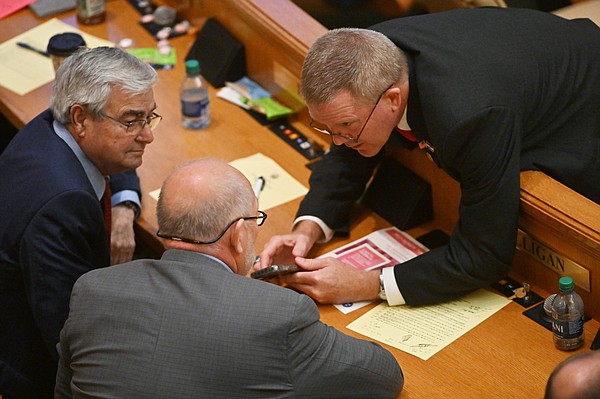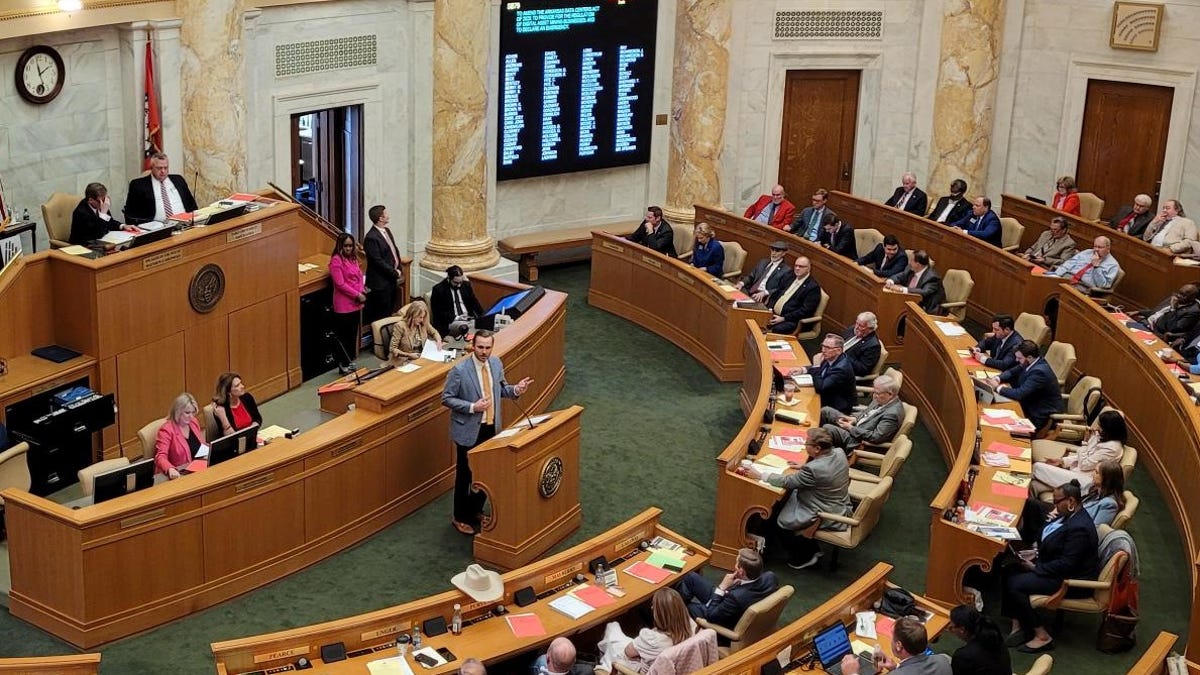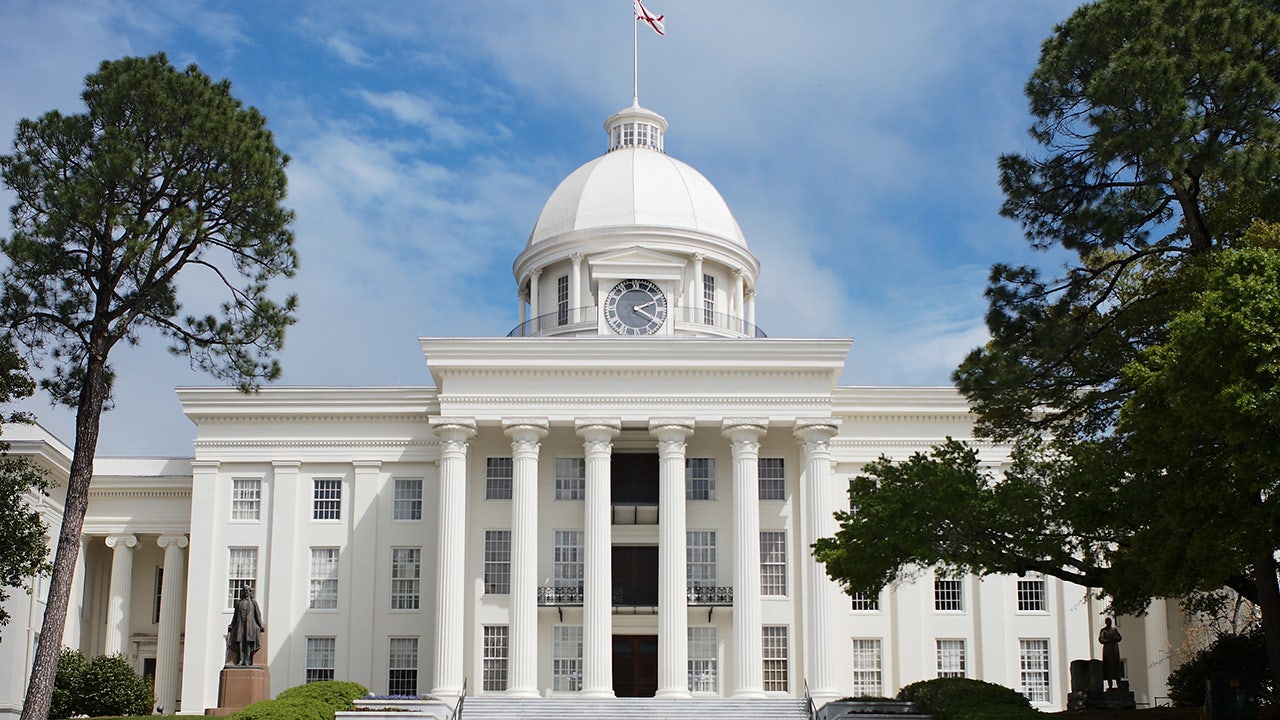The Arkansas Senate and House of Representatives voted Thursday to send Gov. Sarah Huckabee Sanders identical bills that would boost the state’s general revenue budget by $109.3 million to $6.31 billion in the coming fiscal year.
Before the Senate and the House went into a recess for this year’s fiscal session, the Senate voted 33-0 to approve House Bill 1097 by state Rep. Lane Jean, R-Magnolia, and the House voted 88-1 to approve Senate Bill 80 by state Sen. Jonathan Dismang, R-Searcy. State Rep. Austin McCollum, R-Bentonville, voted against SB80.
SB80 and HB1097 would amend the state’s Revenue Stabilization Act for fiscal 2025, which starts July 1, 2024, and ends June 30, 2025.
With “our partners in the Legislature,” Sanders said “we continued to advance our promises to the people of Arkansas — chief among them is slowing the growth of government,” in this year’s fiscal session.
The state’s general revenue budget will increase by 1.76% in fiscal 2025 — below an average of 3% a year in recent years — and that is half of the current inflation rate, Sanders said at a news conference in the governor’s conference room.
“At the same time we are still making critical investments in public safety and education,” the Republican governor said.
“And we are paving the way to cut taxes in the future and eventually and responsibly phase out our state income tax to let Arkansans keep more of their hard-earned money,” she added.
The state would accumulate a general revenue surplus of $376.6 million in fiscal 2025 if the state’s general revenue collections meet the state Department of Finance and Administration’s Feb. 1 forecast of $6.68 billion for net general revenue based on the state’s general revenue budget of $6.31 billion in fiscal 2025.
In its Feb. 1 forecast, the finance department projected a $240.5 million general revenue surplus in fiscal 2024 that ends June 30.
“With two months remaining in Fiscal Year 2024, (Department of Finance and Administration Secretary Jim) Hudson is confident the state revenue surplus will surpass $400 million,” finance department spokesperson Scott Hardin said Thursday.
Senate President Pro Tempore Bart Hester, R-Cave Springs, told reporters he suspects that, if the state’s surplus general revenue exceeds $300 million or $400 million at the end of fiscal 2024, the Legislature will consider cutting income taxes in a special session in August or September. He said he hopes the income tax cuts could be made retroactive to Jan. 1, 2024.
“What we are not interested in is putting ourselves in a position where we are cutting essential services for the people of Arkansas,” he said Thursday.
Asked about plans for a special session later this year to consider tax cuts, House Speaker Matthew Shepherd, R-El Dorado, told reporters: “I wouldn’t say at this point that there’s any significant discussions at this point.
“I think that what has been said in the past by House and Senate leadership and the governor’s office is that, well, we wanted to get a little further down the road this year and take a look at potentially there may be an opportunity for a special session later this summer or early fall to potentially pass an additional income tax reduction,” he said. “That’s my hope. That’s my expectation.”
The Revenue Stabilization Act measures — SB80 and HB1097 — would increase general revenue for the state’s Education Freedom Accounts by $65.7 million to $97.4 million in fiscal 2025. Education Freedom Accounts are vouchers designed to help students attend private school, parochial school or homeschooling.
Sanders’ signature education initiative — the LEARNS Act, which was enacted in the 2023 regular session — created the Education Freedom Accounts. Among other things, the LEARNS Act also increased starting teacher pay from $36,000 to $50,000 a year and authorized $2,000 raises for other teachers.
SB80 and HB1097 also would increase the state’s general revenue for the public school fund by $38.2 million to $2.48 billion, including a $34.2 million increase in general revenue to $2.44 billion for the state Department of Education’s Division of Elementary and Secondary Education and a $4 million increase in general revenue to $26.8 million for career and technical education.
Sanders said the state will grant educational freedom to more families than ever in Arkansas’ history and pay for the highest starting teacher salaries in the nation after factoring in the cost of living.
House Democratic leader Tippi McCullough of Little Rock said in an interview: “I know the governor says this was one of the smallest percentage-wise raising of the budgets ever as far as extra spending, but this is still the largest budget ever.”
“I’m not sure — a lot of the money’s now going to private schools who there’s not much accountability for yet,” she said. “We have some highly paid staff people. We haven’t done enough for the people that feed our kids at school.”
The $109.3 million, or 1.76%, increase to $6.31 billion in the state’s general revenue budget in fiscal 2025 will be the smallest increase since fiscal 2022, state records show.
In fiscal 2022 that ended June 30, 2022, the state’s Revenue Stabilization Act was reduced by $50.4 million, or 0.85%, to $5.84 billion based on state records. State government reported a $1.628 billion general revenue surplus at the end of fiscal 2022.
In fiscal 2025, SB80 and HB1097 also would increase the general revenue allocated to the Division of Arkansas State Police by $3.9 million to $92.5 million in fiscal 2025. The proposal funds an additional Arkansas State Police trooper school.
“We’ll put more state troopers on our roads, making sure that we provide them with the resources and the training they need to keep our communities safe and secure,” Sanders said.
Under the measures, the general revenue for the Department of Corrections’ Division of Correction would increase by $536,285 to $434.8 million and by $571,631 to $105.3 million for the department’s Division of Community Correction in fiscal 2025.
The general revenue allocation for county jail reimbursement would remain at $25.7 million in fiscal 2025. The Legislature and the governor have enacted Act 117 to appropriate $4.2 million more to the state Department of Corrections for reimbursing counties for holding state inmates in county jails and fund the appropriation with $4.2 million in state surplus funds in fiscal 2024 that ends June 30.
The state Department of Human Services’ general revenue allocation would increase by $4.4 million to $1.83 billion under the bills, including a $3.6 million increase to $57.4 million for county operations. State officials said most of the increased general revenue for the Department of Human Services stems from the transfer of the Temporary Assistance for Needy Families program from the state Division of Workforce Services.
The bills also would reduce the total general revenue allocation to the state’s institutions of higher education by $2.4 million to $778.8 million, but also allocate $4.5 million in general revenue to fund a sustainable building maintenance revolving loan program for the state’s higher education institutions in the coming fiscal year.
In total, the measures for fiscal 2025 would increase the University of Arkansas at Pine Bluff’s general revenue budget from $26.1 million to $27.7 million in fiscal 2025, with a $2 million increase to $5.8 million for the university’s land grant matching program.
Under the identical bills, the University of Arkansas, Fayetteville’s general revenue budget would increase by $387,468 to $134.5 million and the University of Arkansas at Medical Sciences’ general revenue allocation would stay flat at $93 million.
The measures also would amend the Infrastructure Investment and Jobs Grants Matching Set-Aside in the Restricted Reserve Fund to provide for matching funds for the Infrastructure Investment and Jobs Act as well as “the Inflation Reduction Act, the CHIPS Act and other infrastructure and certain projects that are majority federally funded” in a sum not to exceed $200 million.
There is $194.8 million remaining in this Restricted Reserve Fund set-side account, said Hardin.
The overall balance in the state’s Restricted Reserve Fund is $2.05 billion, including $710.6 million in the Arkansas Reserve Fund established in legislation enacted in the September special session, Hardin said. The state’s Catastrophic Reserve Fund balance is $1.5 billion, he said.
Hester said, “We held the line on the (general revenue) budget,” and “we have got a lot of reserves and a lot of money in reserves right now.”
He said every lawmaker has water and sewer project needs in their legislative district, “so I am really going to be pushing to spend some surpluses on water and sewer projects across the state.”
Legislative leaders said lawmakers will return to the state Capitol on May 9 to adjourn the fiscal session, which started April 10. May 9 will be the 30th day of this year’s fiscal session, which is the state’s eighth fiscal session.
The state’s shortest fiscal session was 17 days in 2020 at the onset of the covid-19 pandemic, with the state House of Representatives meeting at the Jack Stephens Center at the University of Arkansas at Little Rock. Most lawmakers wore masks and spread out to maintain the recommended distance between them.
The state’s longest fiscal session was 38 days in 2014, the last year that Mike Beebe, a Democrat, served as governor and the second year since Republicans had gained majority control of the Legislature for the first time since Reconstruction.
Information for this article was contributed by Josh Snyder of the Arkansas Democrat-Gazette.








/cdn.vox-cdn.com/uploads/chorus_asset/file/24347780/STK095_Microsoft_04.jpg)

























